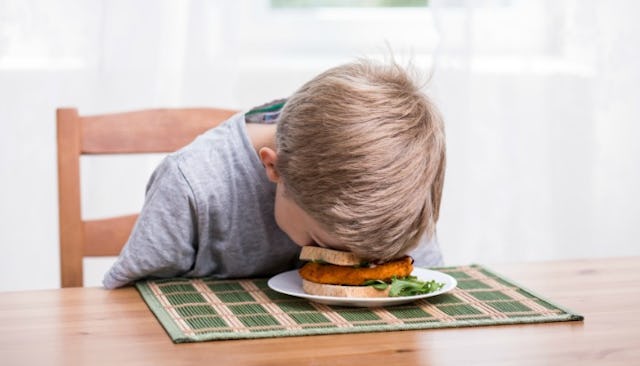Don’t Judge Me For What’s In My Son’s Lunch Box

Recently, my third-grader reported that an aide at his school asked why his lunch consisted only of snack foods and suggested that he should eat a more nutritious lunch.
“Mom,” he said, “I think you should start packing me sandwiches again.”
My first reaction was to laugh. The last four sandwiches I’d packed for him had gone uneaten. Peanut butter and jelly? Too mushy. Nutella sandwich? Not enough Nutella. Cheese sandwich? Soggy. And the list goes on.
I have tried packing thermoses with pasta. I have tried leftovers of his favorite dinner dishes. But no matter what I try, everything comes back with either one little nibble eaten or totally untouched.
Can you tell that my son is a picky eater? Even at 9, he is difficult to feed. It has gotten better as he’s gotten older. He now eats fairly well at home, even if he doesn’t eat the same exact meals the rest of us do. At home, I can reliably get him to eat fruits, vegetables and healthy proteins.
But at school? The lunch room is loud and chaotic. It’s one of the few times during the day that the kids have time to socialize, and my chatterbox son often would rather monkey around with his friends than finish his lunch. Also, I’m almost certain he was born with three times as many taste buds as a normal kid, as well as the nose of bloodhound. The look and smell of cafeteria food doesn’t agree with him at all.
My son has never been diagnosed with something like sensory processing disorder, but he has several of the symptoms—sensitivity to clothing, a low threshold for pain, and his eternally picky palate. I have learned over the years not to fight him on it. I know that picky eating can last well past the toddler years for some kids, and that almost all kids will outgrow it eventually. According to parenting expert Elizabeth Pantley, it is normal for picky eating to last up to age 10, and sometimes into adolescence.
So, because I don’t want him to starve—and because I know I can nourish him fairly well when he gets home—I pack him the foods he will actually eat. And yes, that often ends up being stuff like granola bars, cheese crackers, or if I’m lucky, a bag of nuts or a box of raisins. I try to pack as much protein along with the carbs as possible, but he won’t touch fruits or vegetables unless he’s at home.
It’s not a perfect plan. Like many moms, I am just trying to do the best I can with the cards I’ve been dealt. For now, I am happy that he comes home having eaten anything at all.
As for that little remark from the school aide? I understand where she was coming from. If I were just strolling by and got a peek inside my son’s lunch box, I might be concerned too. I might question it a bit. Maybe I’d even be a bit horrified. I would see the measly bags of snacks and wonder whether this kid’s mom was uneducated about nutrition or just plain lazy.
But I don’t think I would vocalize my concerns. After all, the contents of a lunchbox is too small a detail to make an informed judgment about the entirety of a child’s diet. It’s the same way I wouldn’t judge another parent on whether their kid came to school with messy hair, a wrinkled shirt, or a crumpled sheet of homework. How do I know what else is going on in that child’s home?
I’m not saying this school aide was outright judging me: It was a basic question she asked. But I do know that statements like these tend to come laced with judgments, and I know my son picked up on the criticism. When I asked him if he really wanted me to make him sandwiches that he wouldn’t eat again, he said he didn’t really want one—he just didn’t want to seem strange to the school staff.
Soon after, he let it go, and so did I.
But I was left with that lingering feeling of being exposed. I wondered for a second if I ought to call his school and explain why his lunch looked the way it did. At the same time, I knew I had nothing to prove. I would sound like a fool if I called the school trying to defend my 9-year-old’s eating habits.
Still, it reminded me how vulnerable we parents are to criticism. Even after almost a decade of parenting, I still go through a whole song and dance in my head about my child’s freaking lunch!
Unfortunately, I’m pretty sure the scrutiny about how I feed my kids—as well as a million other judgments about my parenting—isn’t going to fizzle away anytime soon, even as my kids grow older. The good thing is that the more time goes on, the better I get at just letting it roll off my back.
This article was originally published on